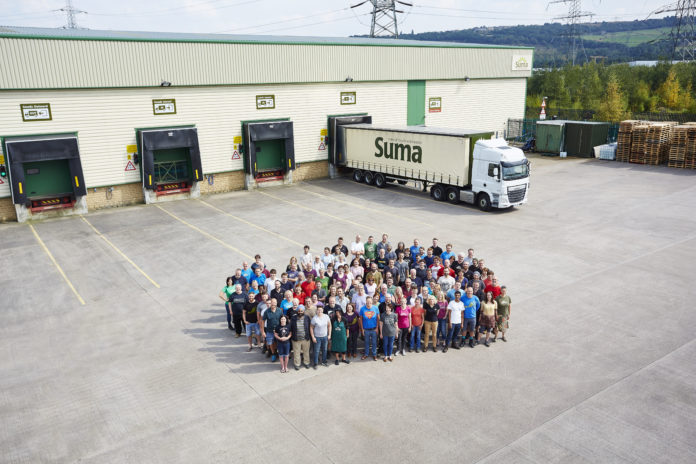Nathalie Spencer talks to Priyanka Jethwa about unique cooperative wholesaler Suma.
Situated in the valleys of Halifax in West Yorkshire, Suma Wholefoods began its journey as a vegetarian, organic wholesaler in the autumn of 1977, when it was founded by Reg Taylor.
Suma is now the UK’s largest independent wholesaler of ethical, organic and natural products. It boasts a unique operational structure, functioning as a democratic, workers’ cooperative, where employees are ‘members’ and lunch is a communal affair.
Unconventional in the wholesale sector, certainly, but working in a cooperative where everyone is paid the same has helped drive the business onto continually greater heights. Not only that, each member works on a rotational job pattern, collectively working across all areas of the operation.
Nathalie Spencer has been a Suma member for 12 years and currently works in international sales and marketing. “I was fresh out of university when I heard about Suma and it sounded fantastic,” she says. “I was working on a temporary basis at first, then I applied for a trial membership, before going on to become a full member.”
Those wanting to qualify for full membership must go through a nine-month trial period. They then need to be voted in by a 75% majority to become a full member. This then entitles them to a ‘share’ of the business – it’s not something you can sell, more a gesture to make members feel as though they are part of Suma in its entirety.
Suma Wholefoods trades in over 7,000 products, ranging from food to household items; around 2,000 are sold under the Suma brand. Its customers are other wholesalers, retailers, foodservice operators and the cost-sector, and the split between retail and foodservice is about 85:15.
Spencer notes that as most wholesalers are chasing the bigger margins on offers in foodservice, it’s important to get the price right. “We get people asking for different prices and we do try to negotiate. But I’d say a lot of people come to us because of our excellent service and cooperative values.”
In all, Suma has roughly 5,500 customers. About 10% of Suma’s sales leave these shores, including customers in Singapore and Chile. But most of its trade is conducted in the UK, delivering to places as far afield as Aberdeen.
Spencer notes: “We’re delivering further than we ever have before on our own fleet, just to make sure customers are getting good service. That’s why we have decided to expand into a regional distribution centre in Greenford, London. London makes sense because of the dense population. Plus, Londoners want what we are offering. There is definitely high demand out there for organic and gluten-free products.”
As lifestyle and dietary choices such as ‘clean eating’ surge in popularity, Suma has benefited. Spencer says: “We saw a high rise in sales when Gillian McKeith was on TV with You Are What You Eat. When she talked about healthy eating, there was a massive boom in the organic food industry, as the show motivated people to make lifestyle changes.”
Following trends is important, but so is keeping a tight range. “We try to be everything to everyone, but we have to consider what is trending,” Spencer says. “If something isn’t selling, we have a policy to delist it, although we try to get it as much exposure as possible.”
The benefit of a cooperative, job-sharing model is that members are able to thrive in every area of the operation. Spencer says: “If anyone asks a question, we can all answer it. We all own the business, so we don’t want to do a disservice to our customers and fail to understand it fully.”
Seven guiding principles bind members, and help Suma and those who work for the cooperative move forward: voluntary and open membership; democratic member control; members’ economic participation; autonomy and independence; education, training and information; cooperation among cooperatives; and concern for community.
This concern for community ultimately stretches to concern for the planet, as Suma works hard to be as green as possible. Spencer says: “We do a lot of tree-planting to offset carbon emissions, working with Treesponsibility. They plant trees on our behalf, but twice a year, we go with them to plant trees locally. We also give back to the community by talking at cooperative events or in schools. We’re currently working with a local school to help them grow a vegetable garden.”
Spencer notes that it can be tough to make decisions while keeping Suma’s core values in mind: “On strategy, coming to a consensus can be a lengthy process, with so many people’s ideas to consider. We have quarterly general meetings where members can put in a proposal. To be met with change, it needs a 50% or 75% majority, depending on whether the proposal would change our constitution.”
Spencer’s advice to other wholesalers wanting to follow a similar model is to join Co-operatives UK and other advisory boards. “But this, of course, involves a commitment on your behalf to sit down and think whether this flat-management, operational structure is for you, as the seven core values are the most important detail of being a co-op,” she adds.
For Spencer, the benefits of a wholesaler operating with this model are rewarding enough to pursue it. She says: “Being on equal pay and having a flat management structure makes for a fair working environment. With this structure, you get to learn about the different areas of the business. Plus, we have a management committee consisting of 50% women – having a gender-balanced workplace is of utmost importance to us, as is highlighting events like International Women’s Day.”
Looking forward, Spencer notes that Suma could potentially open up another warehouse, following on from its venture in London. But with Brexit muddying the waters, she notes: “We could worry about the producers we have in other countries, in terms of getting stock from them. The unknown can be a worry, so we must stay vigilant.”
Suma looks set to continue its strong growth trajectory, though. Its 10-year strategy is to expand its customer reach and to continue to support niche brands.
“I’d like to think that over the next decade, we will be increasing turnover and offering plenty of decent jobs, while keeping our values to grow and flourish as a workers’ co-op,” Spencer says.
Watch the video below to find out Nathalie Spencer’s philosophy in relation to work, the best piece of advice she can offer, and what she gets up to in her spare time.









I see you don’t monetize your blog, don’t waste your traffic, you can earn additional cash every month because
you’ve got hi quality content. If you want to know how to make
extra money, search for: Mrdalekjd methods for $$$
[…] Workers Unite! Nathalie Spencer on the benefits of working at Suma Wholefoods: www.betterwholesaling.com/video-nathalie-spencer-suma-wholefoods/ […]